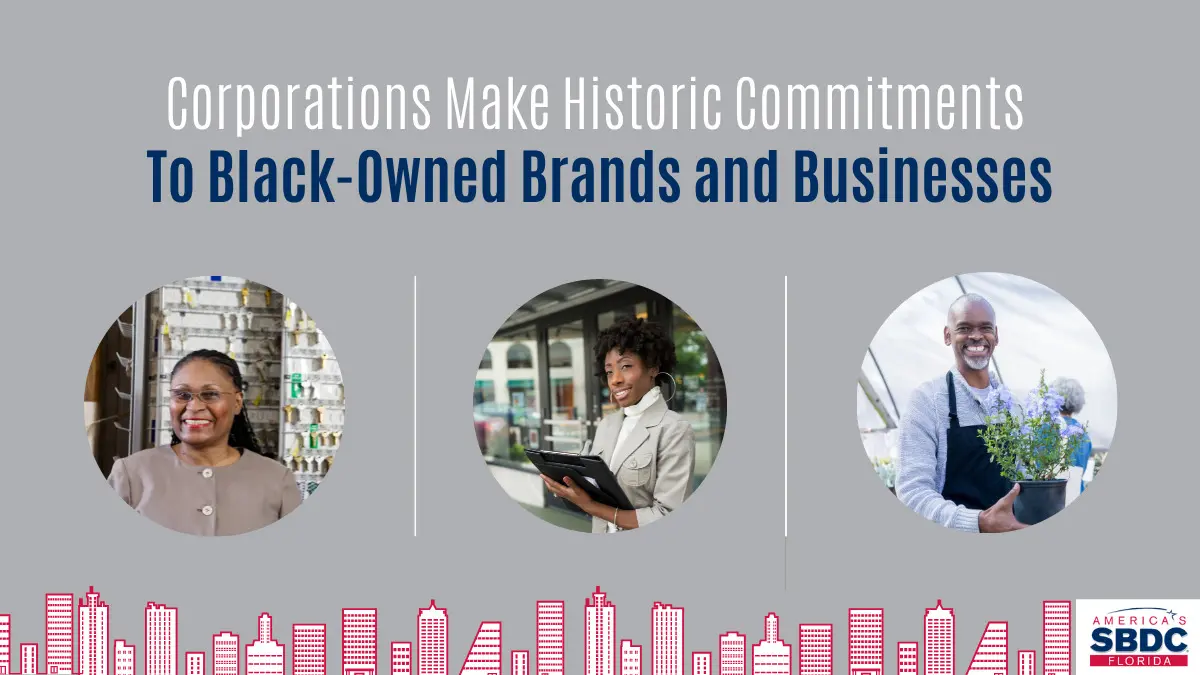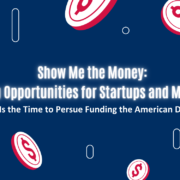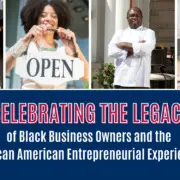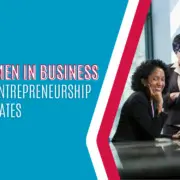Corporations Make Historic Commitments To Black-Owned Brands and Businesses
by Yolanda Goodloe | January 25, 2022
If you’ve ever tried to start a Black-owned business, you’ll know that one of the most challenging aspects of starting or running it is access to capital or the lack thereof. According to an article by McKinsey & Company titled, “Building supporting ecosystems for Black-owned US businesses,” black entrepreneurs are three times more likely than their white counterparts to state a lack of access to capital as negatively affecting their business profitability.
A study published in the Journal of Public Policy and Marketing in 2019 called, Shaping Small Business Lending Policy Through Matched-Pair Mystery Shopping, showed that African-American testers (or test subjects) were more frequently asked to provide information from their business financial statements, personal financial statements, amount of their accounts receivable, and personal W-2 forms when compared to Caucasian testers. Some loan officers even asked about their marital status and the employment status of their spouse, which is dangerously close to directly violating fair lending laws.
The issue at hand is not about Black people not being creditworthy. Reports show that Black business owners and other marginalized entrepreneurs are about half as likely as their white counterparts to receive full financing, even with strong personal credit. The issue is about the racial biases that are so ingrained into lending practices that there’s no way for Black entrepreneurs to win against a system that is set up for them to fail.
The recent focus on racial inequalities within the nation has awakened a reflective review of many practices that have been taken for granted. These practices include the ability of minority-owned businesses to access funding. As a result, the following businesses have made commitments to help build up Black-owned brands and businesses.
Amazon
The Black Business Accelerator aims to help Black entrepreneurs build sustainable equity and growth to enable their success on Amazon. The program provides access to financial support, strategic business guidance and mentorship, and marketing and promotional support. Black-owned U.S. businesses stand to gain access to services and grants that are geared towards helping them jump-start business growth and customer acquisition. They also have access to a network of business mentors and coaches, including Amazon experts and small business thought leaders.
In addition, the Black Business Accelerator creates marketing and promotional support. Black-owned business can also receive opportunities to be featured in the Black-owned business storefronts for Amazon retail customers and Amazon Business customers and promotions featuring Black-owned businesses.
Walmart
The Walmart.org Center for Racial Equity gave Winrock International a grant of $900,000 to support the Readying Small Business for Access to Capital program. This program helps small Black-owned businesses to seek, prepare for and tap into alternative sources of capital to sustain and expand their businesses.
This grant aims to help provide business development support for Black-owned e-commerce and wholesale-retail enterprises in Arkansas, Louisiana, and Mississippi. According to Linsley Kinkade, Winrock’s Senior Director of U.S. Programs, “many businesses have experienced hardship during the pandemic, but Black-owned small businesses in the South’s retail sector have been hit especially hard,” To buttress her point, studies have shown that the impact of COVID-19 and the subsequent economic downturn has had a bigger impact on minority-owned businesses largely because of their inaccessibility to bank financing, funding, and poor cash flow.
With this grant, Winrock can help Black-owned businesses find alternative sources of capital to keep their businesses afloat and expand their enterprises. The Readying Small Business for Access to Capital program will also help connect entrepreneurs to potential loan, grant, and investment opportunities through programs such as Calvert Impact Capitals’ Southern Opportunity and Resilience (SOAR) fund.
Target Corporation
The Target Corporation has committed to spending $2 billion with Black-owned businesses by 2025. The organization intends to accomplish this laudable goal through various means, that includes hiring more Black-owned companies. Target will seek Black-owned advertising firms, suppliers, construction companies, and other related businesses. They also plan on launching a program to identify and support promising minority entrepreneurs.
The company also launched a program called Forward Founders for start-ups led by Black entrepreneurs to help them develop, test, and scale products to sell to mass retailers. It will also be adding products from more than 500 Black-owned brands to its shelves or website.
Already Target is working with 50 Black-owned beauty brands, but they want to expand. According to the company, by 2025, Target will exceed its goals and will have spent more than the committed amount.
Microsoft
In January 2022 Microsoft launched a three-month program called The Black Partner Growth Initiative. This program aims to create pathways for Black-owned partners to engage with the Microsoft Partner Network successfully. The program provides access to information, financial management, tech solutions, and go-to-market readiness training all to help Black partners accelerate their business growth.
Additional benefits to this program include strategic partnerships. Partners are paired with a dedicated specialist through the Cloud Enablement Desk (CED) that will help them grow their cloud business. Partners can also connect to the Solution Workspace to build solutions.
Published solutions and services in the Commercial Marketplace are showcased in the business directory, receive go-to-market benefits and access to readiness training. The Accelerator program provides the additional support needed for Black-owned partners to take their business to the next level through personalized, 1:1 engagement.
Various companies such as Nike, Ulta Beauty, and even Walmart and Microsoft (besides their above-mentioned commitments) have committed to addressing racial inequality by promising to devote more shelf space to Black-owned products, evaluate how they hire and promote employees, feature more Black people in their ads and reduce the number of police or security in stores to prevent racial profiling.
Retailers such as Macy’s, Sephora, and Gap, have signed the 15 Percent Pledge, started by Brooklyn-based entrepreneur Aurora James. The 15 Percent Pledge is a promise to commit 15 percent of shelf-space to Black-owned businesses, which is in proportion to the population of Black people in the U.S.
The fight for racial equality is nowhere near completion. However, the progress made gives us hope for a more equitable future. With support from big corporations, as mentioned above, the future we dream of is closer to being a reality.









Yolanda Goodloe
Consultants, Cowart, Government Contracting Consultants, PinellasFlorida PTAC at Pinellas County Economic Development
Specialty: Procurement
Yolanda Goodloe has more than 20 years of experience in public service at the local and municipal levels. Early in her career, she worked as a human resources and relations professional while serving as a liaison to the business community and advocacy groups. Her prior experience includes being a human relations specialist for Lee County Government, and an equal opportunity director for the City of Fort Lauderdale. Her background combines public service and human relations experience with hands on leadership in equal opportunity, supplier diversity, business certifications programs, organizational training and development, and managing workforce diversity principles. Goodloe is the procurement specialist for the Florida PTAC at Pinellas County Economic Development. She connects businesses to resources and tools for state, local, and federal contracting opportunities. She is a Certified Procurement Professional (CPP), a Supply Chain Management Professional (SCMP), and a Certified Verification Counselor. She graduated from Florida State University with a bachelor of arts in political science and history.